Quick wins
Long wait, long read: After seven years, Sir John Chilcot has finally published the conclusions of his inquiry into the 2003 Iraq invasion and its aftermath. Split over 12 volumes, the report runs to 2.6 million words, around five times the length of War and Peace.
Sterling slump: The pound plummeted after the UK voted to leave the EU. In the following days, it passed the Argentine peso as the world’s worst performing currency, down 12% since January, and hit a 31-year low against the dollar.
Dwindling reserves: The value of council reserves in England has fallen by 1.5% to £21bn since last year, according to CIPFA and the Department for Communities & Local Government. Of this, £17.3bn is earmarked for specific purposes.
Brexit: for better or worse?
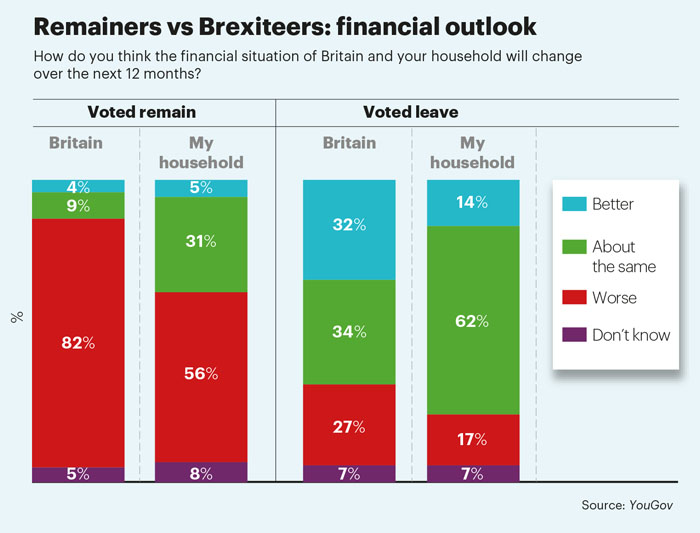
Polling of remain and leave voters by YouGov reveals some stark differences in attitude regarding the impact of Brexit on national and household finances.
Remain voters are far more pessimistic about the financial outlook, with 82% expecting the decision to be bad for the UK economy and more than half (56%) expecting their household finances to take a hit.
In contrast, just over a quarter (27%) of leave voters predict economic turmoil to arise from Brexit, while one third think the situation will improve and another third expect no change. In terms of household impact, three out of four leave voters think their finances will either stay the same or get better.
Je ne regrette rien
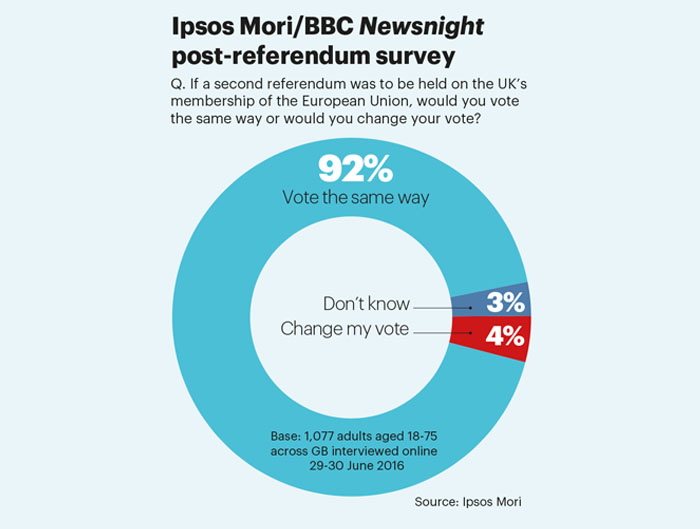
Rumours of “regrexit” may have been somewhat exaggerated. A post-referendum survey of almost 1,000 18-75 year olds by Ipsos Mori for the BBC’s Newsnight programme revealed that just 4% of voters said they would vote a different way given a second chance.
Nine out of 10 voters are happy with their choice, with remain voters slightly more certain that they would not change their mind – 85% of remain voters said they would definitely vote the same way, compared with 75% of leave voters.
Youth apathy is overstated
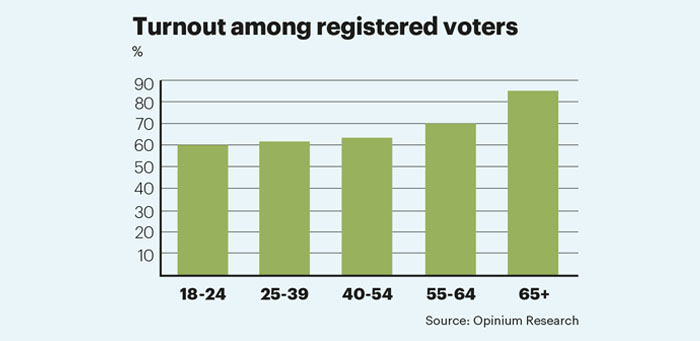
Apathetic younger voters have been blamed for helping to deliver the leave verdict in the 23 June referendum. Younger people strongly favour remaining in the EU, but many could not be bothered to get out and vote – or so the theory goes. However, research from Opinium suggests turnout among younger age groups – at 64% for 18-24 year olds and 65% for 25-39 year olds – was closer to the expected population average.
While turnout was notably higher among older age groups, the difference between generations was probably less than might be expected at a general election. “In that sense, it is certainly unfair to criticise [young people’s] right to have an opinion on the outcome on the ground that they ‘did not bother to vote’,” Opinium suggested.
Capital receipts
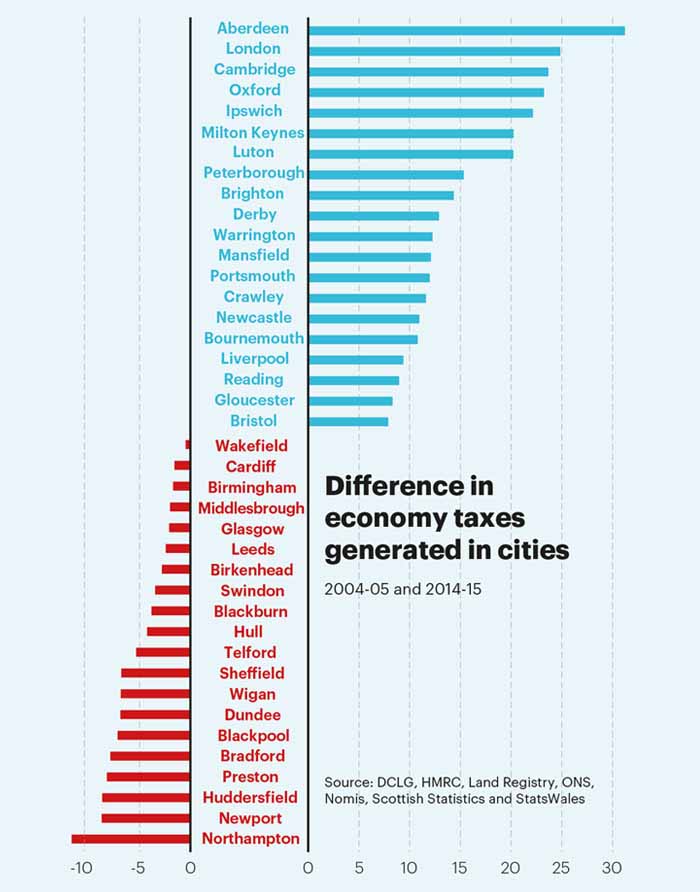
Over the past decade, public finances have become increasingly dependent on taxation raised from London, while the share of revenue raised from a host of other cities has fallen, a Centre for Cities report has found.
In a review of economy taxes – such as income tax, land and property taxes, and VAT, but excluding consumption taxes like alcohol and tobacco duty – the think-tank found the capital contributed 28.6% of national tax take in 2014-15. This was up from 25.3% in 2004-05 and amounts to a £28bn increase in cash terms. In contrast, the next four biggest city contributors to national tax take – Manchester, Birmingham, Glasgow and Leeds – all saw their contributions fall in percentage terms.
This is partly due to the financial crisis and recession, which is still being felt in
British cities, with more than three-quarters of them generating less tax now than in their pre-recession peak.
War and remembrance
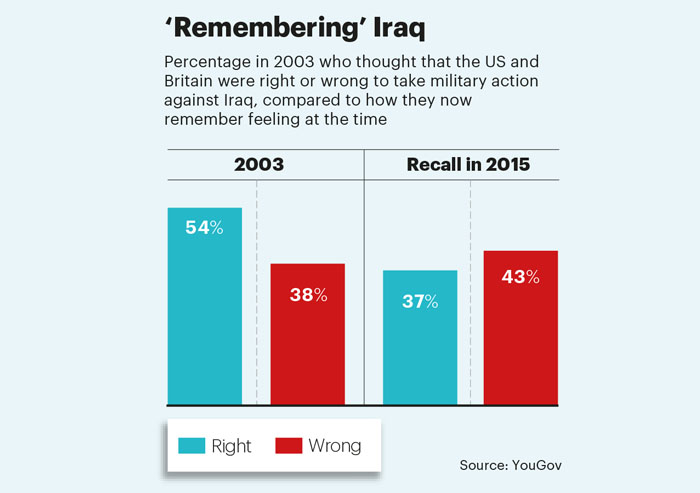
Time can clearly distort our perceptions. In the light of the publication of Sir John Chilcot’s inquiry into the Iraq war, YouGov highlighted 2015 research which asked people how they remembered feeling about the war at the time.
More than four in 10 (43%) opposed the war, while 37% said they thought it was right. This contrasts with data from 2003, which suggested that more than half of those polled (54%) agreed with the Iraq invasion, while just 38% thought it was the wrong thing to do.
YouGov noted, however, that the two groups surveyed did not completely overlap. Twentysomethings surveyed today, for instance, would have been too young to poll 13 years ago.
Population projection
There were 65,110,000 people living in the UK at the end of June last year, according to the Office for National Statistics.
In the year to June 2015, the number of residents increased by just over half a million, in line with the average annual increase seen over the past decade.
The rise is explained by natural growth (more births than deaths), net international migration of335,600 and the return of 5,800 armed forces personnel who had been living abroad.
Numbers of older people continue to rise. Almost 18% of the population – 11.6 million people – are aged over 65, while 2.3% – 1.5 million people – are aged 85 or older. Since mid-2005, the UK population aged 65 and over has grown by 21%, and the population aged 85 and over has risen by 31%, the ONS said.



















